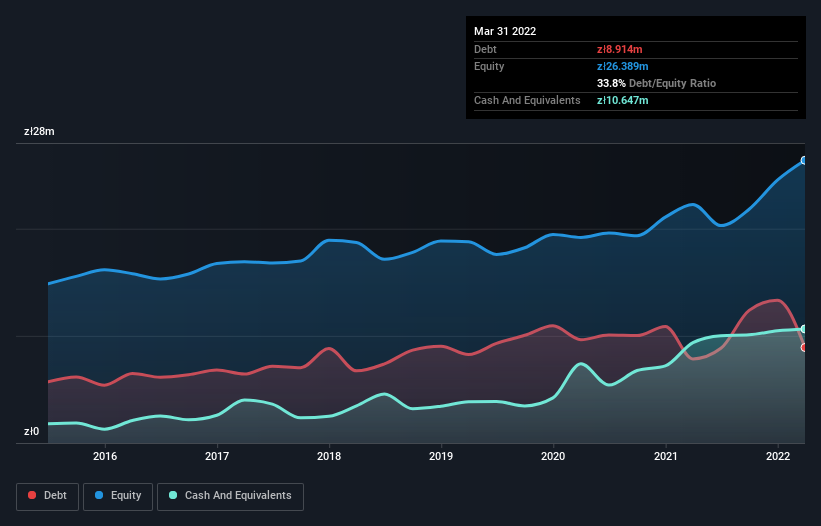
Howard Marks put it nicely when he said that, rather than worrying about share price volatility, 'The possibility of permanent loss is the risk I worry about... and every practical investor I know worries about.' When we think about how risky a company is, we always like to look at its use of debt, since debt overload can lead to ruin. We note that Internity S.A. (WSE:INT) does have debt on its balance sheet. But the real question is whether this debt is making the company risky.
When Is Debt A Problem?
Debt and other liabilities become risky for a business when it cannot easily fulfill those obligations, either with free cash flow or by raising capital at an attractive price. Part and parcel of capitalism is the process of 'creative destruction' where failed businesses are mercilessly liquidated by their bankers. However, a more usual (but still expensive) situation is where a company must dilute shareholders at a cheap share price simply to get debt under control. Of course, debt can be an important tool in businesses, particularly capital heavy businesses. The first step when considering a company's debt levels is to consider its cash and debt together.
Check out our latest analysis for Internity
What Is Internity's Net Debt?
You can click the graphic below for the historical numbers, but it shows that as of March 2022 Internity had zł8.91m of debt, an increase on zł7.85m, over one year. However, it does have zł10.6m in cash offsetting this, leading to net cash of zł1.73m.

How Strong Is Internity's Balance Sheet?
Zooming in on the latest balance sheet data, we can see that Internity had liabilities of zł46.4m due within 12 months and liabilities of zł2.18m due beyond that. Offsetting this, it had zł10.6m in cash and zł6.43m in receivables that were due within 12 months. So its liabilities total zł31.5m more than the combination of its cash and short-term receivables.
Given this deficit is actually higher than the company's market capitalization of zł30.8m, we think shareholders really should watch Internity's debt levels, like a parent watching their child ride a bike for the first time. Hypothetically, extremely heavy dilution would be required if the company were forced to pay down its liabilities by raising capital at the current share price. Given that Internity has more cash than debt, we're pretty confident it can handle its debt, despite the fact that it has a lot of liabilities in total.
In addition to that, we're happy to report that Internity has boosted its EBIT by 67%, thus reducing the spectre of future debt repayments. The balance sheet is clearly the area to focus on when you are analysing debt. But it is Internity's earnings that will influence how the balance sheet holds up in the future. So if you're keen to discover more about its earnings, it might be worth checking out this graph of its long term earnings trend.
Finally, a company can only pay off debt with cold hard cash, not accounting profits. While Internity has net cash on its balance sheet, it's still worth taking a look at its ability to convert earnings before interest and tax (EBIT) to free cash flow, to help us understand how quickly it is building (or eroding) that cash balance. Over the most recent three years, Internity recorded free cash flow worth 76% of its EBIT, which is around normal, given free cash flow excludes interest and tax. This cold hard cash means it can reduce its debt when it wants to.
Summing up
Although Internity's balance sheet isn't particularly strong, due to the total liabilities, it is clearly positive to see that it has net cash of zł1.73m. And we liked the look of last year's 67% year-on-year EBIT growth. So we are not troubled with Internity's debt use. There's no doubt that we learn most about debt from the balance sheet. However, not all investment risk resides within the balance sheet - far from it. Be aware that Internity is showing 3 warning signs in our investment analysis , and 1 of those is potentially serious...
Of course, if you're the type of investor who prefers buying stocks without the burden of debt, then don't hesitate to discover our exclusive list of net cash growth stocks, today.
New: AI Stock Screener & Alerts
Our new AI Stock Screener scans the market every day to uncover opportunities.
• Dividend Powerhouses (3%+ Yield)
• Undervalued Small Caps with Insider Buying
• High growth Tech and AI Companies
Or build your own from over 50 metrics.
Have feedback on this article? Concerned about the content? Get in touch with us directly. Alternatively, email editorial-team (at) simplywallst.com.
This article by Simply Wall St is general in nature. We provide commentary based on historical data and analyst forecasts only using an unbiased methodology and our articles are not intended to be financial advice. It does not constitute a recommendation to buy or sell any stock, and does not take account of your objectives, or your financial situation. We aim to bring you long-term focused analysis driven by fundamental data. Note that our analysis may not factor in the latest price-sensitive company announcements or qualitative material. Simply Wall St has no position in any stocks mentioned.
About WSE:INT
Solid track record with excellent balance sheet.
Market Insights
Community Narratives




